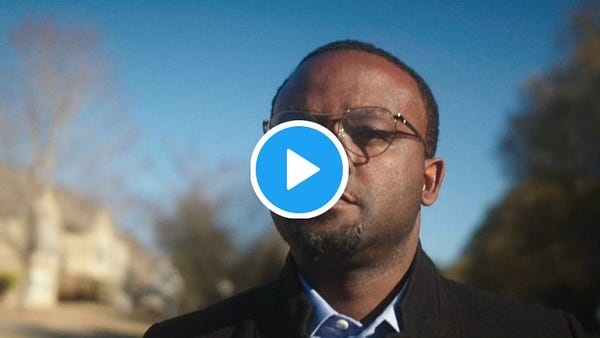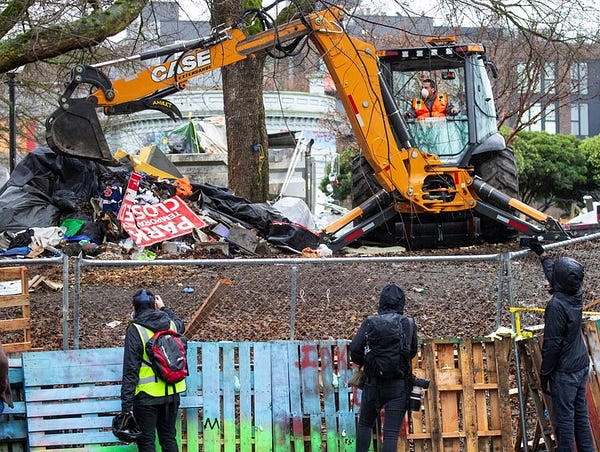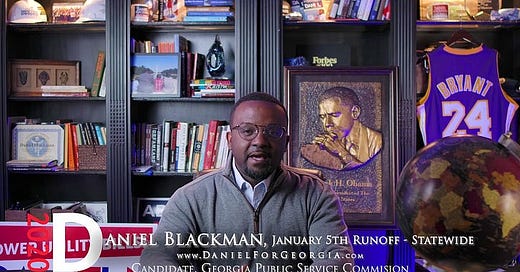Welcome to the big Sunday edition of Progressives Everywhere!
I’ve got a packed newsletter for you today, including a big interview with a key candidate in the Georgia runoffs, some piercing analysis, and all kinds of important under-the-radar news from across the country.
Thank you to our latest crowdfunding donors: Ashmou, Karen, and Gloria!
The Other Huge Race in Georgia
In the ultra-tight runoff election scheduled for January 5th, a progressive Democrat has the chance to break the GOP’s years-long lock on policy-making, a hegemony that has left the environment polluted, working people gouged by big corporations, many Black communities robbed of opportunity, and lawmakers increasingly unresponsive to the demands of their constituents.
Oh, and there will also be two US Senate elections on January 5th as well.
It’d be an understatement to say that the race for a spot on the Georgia Public Service Commission hasn’t received the same level of attention as the Ossoff-Perdue and Warnock-Loeffler showdowns, but that doesn’t mean that it isn’t important. In fact, it’s the sort of down-ballot position that has an outsized impact on people’s lives but has been largely ignored by Democrats over the last few decades. Thanks to the energetic campaign of activist, nonprofit leader, and Obama administration vet Daniel Blackman, that’s now changing. (It also doesn’t hurt that instead of appearing 13th or 14th on the ballot, it was just below the Senate races this year.)
Georgia’s Public Service Commission oversees all utilities, from power production to broadband internet. Its members play a huge role in setting environmental policy and helps determine the utility rates paid by millions of people in the state. Their decisions have wide-reaching implications, with racial justice, environmental pollution, and economic opportunity all directly impacted.
One quick example: Georgia is the only state in the country building new nuclear power plants. Republicans continue to green-light the projects, which accrue huge cost overruns which in turn get passed to Georgia consumers. They continue to invest in these projects, funneling money to the privately held Georgia Power monopoly, gouging people on their monthly energy bills instead of investing in the solar and wind power that would help the environment and save people money.
“Folks in Georgia have been footing the bill for a long time, not just on nuclear, but on our coal ash cleanup [another $525 million], and its really been a burden on folks,” Blackman says. “That people are struggling COVID-19 has amplified that a thousandfold.”
Those struggles, Blackman says, have created an awareness of the commission where it hadn’t existed before — being stuck at home without broadband internet, seeing your neighbors’ lights go off, and watching your bills rise during a money crunch tends to create some outrage. The urban-rural divide in the state is stark, too. While the Atlanta area, where activists and organizers have built an army of progressive voters, is filled with rich industries like entertainment and tech, more outlying counties have been devastated.
As Blackman notes, 79 different counties — or half the state — do not have a single OBGYN. There are 60 without a pediatrician, while nine counties have no doctors at all. The reasons are somewhat complicated and very intertwined, but the lack of economic opportunity that comes with a significant lack of access to broadband — 70% of the more than half a million homes and businesses without it are in the rural part of the state — is a huge part of it.
“Those communities have been left behind,” he says. “And it’s Black and brown communities specifically. About 88% of Georgia's prison population reads at a third-grade level. So if we don't connect those communities in those counties, those kids have no options, and they can't read, they can't write, they can't compete. Those kids end up falling into a vicious cycle of poverty and incarceration. If you want to prevent that, you've got to educate them and allow them to keep up with technology.”
Blackman has been working in environmental and community advocacy for two decades. He graduated from college, married his girlfriend, and then based on a friendship with one of his professors, found himself recruited into a new coalition of promising young leaders. His new mentors couldn’t have been more distinguished; they included former Mayor Maynard Jackson, Rep. John Lewis, the Reverend Joseph Lowery, and the future Mayor Shirley Jackson.
That opportunity turned into a career. Blackman began working for nonprofits and in the civil rights community. He was always invested in the environment and trying to connect Black voters with that movement, which led to what he recalls as a frank conversation with former Vice President Al Gore around the time An Inconvenient Truth was released.


“I remember he wanted me to get some black ministers and send students from the historically black colleges [to the event],” Blackman recalls. “He asked me a question and I remember saying to him, and this was awkward, but I said ‘with all due respect, Mr. Vice President, I think it reaches some people, but I don't think it's gonna resonate with my community.”
Naturally, Gore wanted to understand why.
“I said ‘you movie is about polar ice caps melting and polar bears and sea levels rising, but [the environmental issue that] folks in our community are concerned about is their kids with asthma,” he recalls. “We don't really see ourselves in what's produced.”
Blackman agreed to help promote the movie to the Black community so that he could help overcome that disconnect. Connecting climate, pocketbook economics, and the Black community has long been a focus for Blackman. After helping then-Senator Barack Obama in the Democratic primary, he was appointed to several White House initiatives. Blackman participated in Michelle Obama’s Let’s Move campaign as well as President Obama’s high-profile My Brother’s Keeper initiative. That was a formative experience, as was his trip to the Vatican for a papal climate change summit in 2015.
“It was surreal — it was every culture, every background, and to witness that and to have the Pope acknowledge us while we were there,” Blackman says, still marveling years later. “And to see the fact that 125 environmental regulations have been dismantled by the Trump administration, it's heartbreaking because I had a front-row seat to a lot of great things that happened. It transformed my life and helped propel me to where I am today.”
Having one Democrat sitting on a five-person commission won’t significantly alter the balance during the commission’s internal debates. Black is well aware of this obvious limitation. But he also comes out of movement politics, where outside forces push hard to force lawmakers and legislators into enacting (or not enacting) policy. His goal is to use a spot on the commission to sound the alarm and ensure that the civil rights, economic opportunity, and gross environmental abuses that often come out of the Public Service Commission are made public and, when possible, reversed.
“We started off our campaign by committing to not take any money from the fossil fuel industry, their executives, anyone or any entity regulated by the Public Service Commission,” he says. “We're not going to have these backroom meetings that are off-the-record; we're going to make sure it's all transparent, that everyone knows what’s happening. We’re going to have town halls and regional meetings around the state — most people don't know about the Public Service Commission, because they don't ever leave their offices. We’ll be out-voted in some areas, but we’ll be taking utility companies to task by making sure that whatever they do or fail to do you, that it’s put in front of the people.”
Winning this election is a stepping stone towards both better politics and better policies. All too often, as we’ve seen over the last decade, Democrats have either ignored these offices or failed to do anything with power to help people’s lives. If Blackman can win here, it’ll wake the party up to the importance of these kinds of races and, with success, show people that government actually can do something for them. In a neck-and-neck race, every little bit of help is crucial.
Important News You Need to Know
Maybe one day we’ll get an afternoon off from the chaos… but for now, it’s news time!
Stimulus deal nears… and well, we’re gonna need more very soon.
Congressional leaders will soon announce a stimulus deal. Thanks to pressure from the left, savvy right-wingers like Josh Hawley, smart strategy from Georgia Senate candidates, and the advice/outrage in this newsletter (okay but I was right), the deal is… not quite as awful as it could be.
Months and months after extended unemployment ran out, the new stimulus will offer struggling Americans half as much as they got in the CARES Act while retaining a vast majority of the corporate money cannon fired at Wall Street (a demand of Democrats, of course). But here’s the rub: the measly $600 checks that are supposed to get people through the winter are means-testing and will only go to people who made under $75,000 in 2019, which discounts the tens of millions of people who lost their jobs and went broke this year.
That’s a gross travesty and will absolutely be met with vast anger in about a month from now.
For now, Senators and members of Congress will slap themselves on the back, make some grand announcement about helping hardworking Americans, and then go home to their massive homes to enjoy a Christmas that will, given their track record, not involve social distancing. It’s a disgrace.
My advice: Jon Ossoff and Raphael Warnock should run on the fact that if they win, Americans will get much more expansive survival checks and unemployment benefits. And then if it works, it’ll be on us to pressure Democratic leaders to make it happen.
Homeless sweeps in the cities
The stimulus will feature an extension of the CDC eviction moratorium, though it’s likely to last just one month. Worse, the moratorium is riddled with loopholes and hasn’t stopped well over 10,000 Americans from being kicked out of their homes, which has contributed to mass homeless encampments in cities across the country.
And now, mayors in some of those cities are kicking the unhoused out of their ramshackle encampments.
This is what’s happening in Seattle:


And here’s what’s going down in Denver (where it happens quite often):



You would think that the resources that go into policing unhoused people and razing their dilapidated cardboard shelters would be better used on sustainable housing policy, but I guess there’s no powerful interest group in favor of doing that…
Georgia updates
So, back to Georgia, where those Senate elections are already setting records.
Good news: A whopping 1.3 million people have already cast their vote in the special Senate runoff elections.
Good news: Courts have been rejecting Republican lawsuits that sought to place limitations on who can vote in January.
Bad news: Republicans have more lawsuits up their sleeves, including efforts to close polling places, limiting voting hours, and get hundreds of thousands of votes tossed for no discernible reason.
Bad News: Limiting polling places in Cobb County has increased wait times and depressed turnout numbers thus far.
Good Weed News!
The legislature in New Jersey, where voters chose to legalize recreational marijuana last month, just passed a large bill that sets the terms, conditions, and regulations for the cannabis marketplace.
The bill, which now goes to Gov. Phil Murphy for his expected signature, would fast-track existing medical marijuana operators and impose cultivation caps in the first two years, with licensing designed to increase according to market demand.
Provisions include giving licensing priority to microbusinesses owned by residents as well as applicants from economically hard-hit communities or those impacted by the war on drugs.
The bill finally made it to the floor in part after Murphy and leading lawmakers agreed to target 70% of the tax revenue to communities most harmed by the war on drugs.
Elsewhere, in Kentucky, Gov. Andy Beshear called on the legislature to make the state a lot more fun by approving sports betting and legalizing medical marijuana. It’s pretty crazy to see how big a gulf there is between some states on this, but it does give Democrats an opportunity to seize on a popular issue, as I wrote earlier this week.
And in Florida, an activist group is already collecting signatures to put marijuana legalization up to voters in a ballot initiative in 2022. State officials, aware that progressive initiatives generally win, are trying to have Make It Legal’s ballot petitions thrown out by a judge. Interestingly, trollish Rep. Matt Gaetz is actually publicly advocating for legalization, having been a force behind a medical marijuana campaign in 2014. Crazy to think that that guy might smoke weed!
If the federal government legalized marijuana, all of the above would be a moot point, but there’s been little progress there until, well, last week. The DEA, which had frozen progress in medical marijuana laws under Trump, just loosened its rules and widened the kinds of businesses that can grow weed.
Most other Democratic candidates were pretty pro-legalization, but Joe Biden, whose views on drugs and many other issues seemed permanently stuck in the 1990s, has expressed opposition again and again. He does seem open to decriminalization, which wouldn’t require any legislation, though.
How do these people get elected?

I’ll be honest: I’m actually kind of jealous. I don’t want batshit extremists on our side, but I do hate that any lawmaker who is in any way to the left of Joe Biden is portrayed by the media as either out-of-touch or downright deranged. Republicans like Clay Higgins get to spout their nonsense with zero consequences, which radicalizes the right-wing while nobody’s paying attention. It’s easy to laugh at stuff like the above tweet, and that was absolutely my first reaction, but it’s also a bit scary.
Wait, Before You Go!
This week, Progressives Everywhere surpassed over $5.7 million dollars raised for progressive Democratic candidates and causes. Isn’t that cool?
That said, none of that money goes to producing this newsletter or all of the related projects we put out there. Not a dime! In fact, it costs me money to do this. So to make this sustainable, I need your help.
I’m offering very low-cost premium subscriptions that offer a lot of goodies. If you become a member of Progressives Everywhere, you’ll get:
Frequent election season emails with deep dives into elections and the crucial political stories not getting enough attention. You’ll read the news before anyone else you know.
Exclusive updates from candidates and interviews with other progressive leaders.
Coverage of voting rights, healthcare, labor rights, and progressive activism.
The satisfaction of financing new projects like AbsenteeBallots.info and COVIDSuperSpreaders.com.
A new best friend (me).
You can also make a one-time donation to Progressives Everywhere’s GoFundMe campaign — doing so will earn you a shout-out in an upcoming edition of the big newsletter!



